Cooking Wars: Culinary Showdowns in Anime and Manga
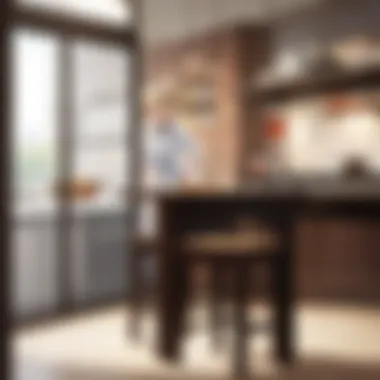

Intro
In the rich world of anime and manga, the concept of culinary competitions has emerged as a compelling narrative device. These cooking wars often depict characters engaging in intense battles that test not only their skills but also their personalities and relationships. As audiences, we are drawn to these heated culinary face-offs that go beyond mere cooking; they delve into thematic elements that resonate with cultural values and personal growth.
Character Analysis
Overview of Character Development
The characters in cooking-themed anime and manga often serve as reflections of various culinary archetypes and societal roles. For example, in Shokugeki no Soma, we can observe the evolution of Yukihira Soma as he transitions from a confident underdog to a formidable chef. This journey is marked by significant challenges in cooking wars, where Soma's resilience and creativity are tested. These experiences contribute to his growth, suggesting that cooking is not just a skill but also a pathway to self-discovery.
The character of Erina Nakiri, often portrayed as an elitist connoisseur, offers a contrasting perspective. Her initial disdain for Soma's casual cooking style transforms into respect as she witnesses his talent. This character development reflects themes of tradition versus innovation in the culinary world, highlighting how competition can bridge gaps between differing viewpoints.
Key Relationships and Dynamics
Relationships among characters in these culinary battles often deepen as a result of competition. In Food Wars! for instance, the rivalry between Soma and his peers fosters camaraderie, creating a network of support and rivalry that drives the narrative. The relationship between Soma and Erina showcases this dynamic, as their clashes ultimately evolve into mutual respect and understanding.
Another critical relationship exists in Koufuku Graffiti, where cooking is portrayed as a means of nurturing bonds. The interactions between Ryou and her friends demonstrate how food can create solidarity and warmth, shifting the focus from competition to collaboration in the culinary arts.
Thematic Exploration
Central Themes and Messages
Cooking competitions in anime and manga showcase various themes that resonate with audiences. One prominent theme is the struggle for mastery. Characters often face formidable opponents, symbolizing the pursuit of excellence. Competitions reveal not only culinary techniques but also the protagonists' growth under pressure.
Additionally, themes of friendship and rivalry are prevalent. These dynamics create a tension that keeps viewers engaged, as characters seek to improve themselves while also supporting their friends. This duality signifies that culinary arts can unite people, despite the competitive environment.
Cultural Context and Influences
The depiction of cooking wars in anime and manga reflects Japan’s cultural relationship with food. Culinary competitions resonate deeply with the Japanese ethos of craftsmanship and mastery, known as monozukuri. This cultural influence emphasizes the dedication and precision required in cooking, elevating the art to a form of self-expression.
Moreover, the integration of food culture in storytelling highlights the importance of community as meals often bring people together. The resurgence of cooking wars in modern narratives serves as a reminder of the significance of food in both personal and communal settings.
"Food is not just sustenance; it is culture, tradition, and connection."
Prologue to Cooking Wars
In the world of anime and manga, culinary battles hold a unique position. These contests of skill often convey deep cultural meanings and character development. They serve as a medium for storytellers to express tradition, innovation, and community through food. Analyzing these narratives reveals how cooking wars shape and reflect broader themes in society.
Cooking wars are not merely battles to create the best dish; they represent the clash of philosophies, personal growth, and the intricacies associated with food. The emphasis on competition promotes a sense of determination and resilience in characters. Fans are often drawn to these stories due to their relatability and the universal appeal of sharing food.
Defining Cooking Wars
"Cooking wars" can be defined as intense culinary competitions depicted in anime and manga. These events typically feature characters who prepare elaborate dishes with high stakes involved. The characters often compete against each other not just for victory but for honor, reputation, or to learn a valuable lesson.
These battles can range from formal contests judged by culinary experts to informal cook-offs among friends. The essence remains that the outcome significantly influences character arcs and the overall narrative.
Some notable series like "Shokugeki no Soma" elevate this idea of cooking wars, integrating it into the plot at various levels of intensity and seriousness, making the stakes feel more profound. Through vivid portrayals of culinary creations, these anime showcase the art of cooking as both a skill and a form of self-expression.
Historical Context of Culinary Competition
The roots of culinary competitions stretch back to various cultures around the world. Historically, societies have used food contests to showcase skills and creativity. In Japan, for instance, cooking practices often included communal festivals where the preparation of rice and other endemic ingredients symbolized unity.
This concept of competition has evolved. In modern times, shows like "Iron Chef" introduced a structured approach to culinary battles. This format emphasized showmanship alongside cooking skills, influencing the way competitions are depicted in anime and manga. Each series adapts this historical context, often incorporating specific cultural elements that resonate with the audience.
Understanding this history helps to appreciate the significance of culinary competitions in contemporary narratives. These competitions are not simply for entertainment; they reflect a tradition ingrained in collective identity, creativity, and the sharing of culinary knowledge.
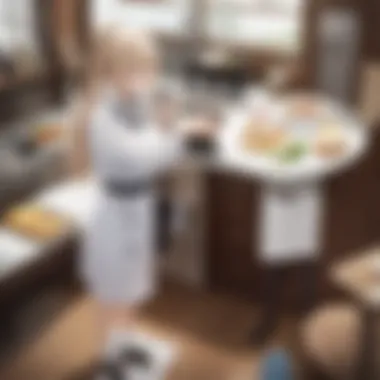
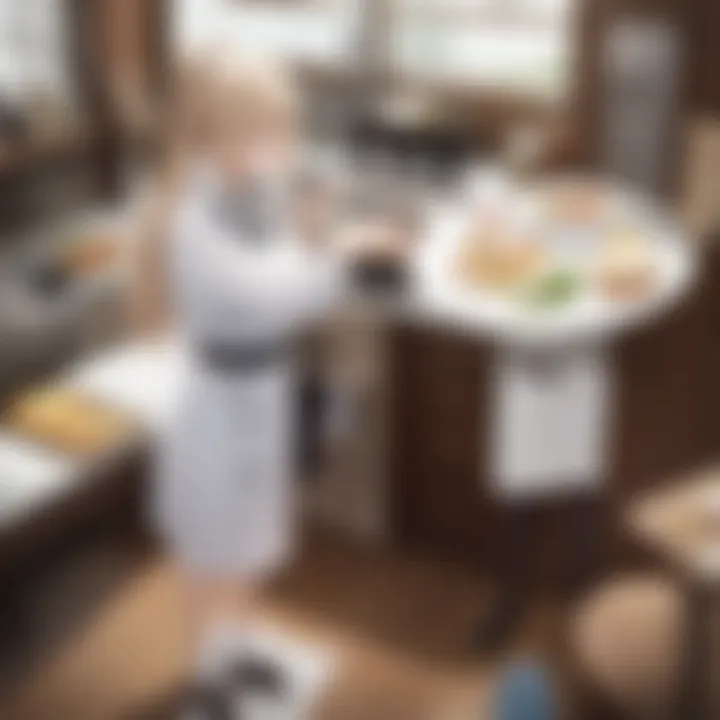
"Cooking is an art, and culinary contests are showcases of innovation and tradition intertwined."
Culinary Competitions in Popular Anime
Culinary competitions in popular anime serve not only as a source of entertainment but also as a platform for cultural expression. They highlight the significance of food in society and its role in character development. Through cooking battles, anime encapsulates a variety of themes, such as rivalry, friendship, and personal growth. The narratives surrounding these competitions often reflect real-world culinary traditions, enhancing the viewers' understanding of cultural practices.
These competitions provide a medium for characters to showcase their skills and creativity, creating intense moments that captivate the audience. The stakes are often high, with personal honor, relationships, or even futures on the line. Such dramatic portrayals elevate cooking from a mere routine task to a theatrical performance, drawing viewers into the world of culinary artistry.
In addition to narrative depth, these anime titles encourage viewers to appreciate gastronomical aesthetics. Meals depicted in shows inspire fans to experiment with their own cooking, fostering a connection between the viewer and the culinary arts. Overall, this section examines notable titles, offering insights into how culinary battles shape narratives and engage the audience on multiple levels.
Shokugeki no Soma: A Case Study
Shokugeki no Soma stands as a prominent example of culinary competition in anime. The story revolves around Soma Yukihira, an aspiring chef who enrolls in Totsuki Culinary Academy. Here, he faces off against talented peers in cooking duels known as "shokugeki." These battles not only test Soma's culinary skills but also his ability to innovate under pressure.
The series uses these competitions to explore themes of perseverance and creativity. Each cooking duel serves as a vehicle for character development. Soma must adapt and push his boundaries, leading to significant growth throughout the series. The show also introduces various cooking techniques and dishes, making it an educational experience for viewers.
Additionally, Shokugeki no Soma emphasizes the importance of presentation in culinary arts. The visually striking and often exaggerated depictions of dishes make the experience immersive. The dramatic reactions of characters tasting the food further enhance the emotional stakes, making each competition a thrilling event.
Yurucamp: Cooking as Community
In Yurucamp, cooking takes on a communal aspect, focusing on the bond formed through shared meals. While not a competitive cooking anime in the traditional sense, it illustrates the significance of food in building relationships. The characters, including Rin and Nadeshiko, engage in various cooking activities during their camping adventures.
The show highlights the joy of preparing and sharing food together, portraying it as a foundational element of friendship. Cooking here is less about competition and more about creating memories. Each meal becomes an event, showcasing the flavors of nature and the warmth of companionship.
This narrative approach invites viewers to appreciate how food can foster connections. It encourages viewers to explore cooking not just as a task but as a way to enhance relationships with others, emphasizing the communal aspect of culinary experiences.
Koufuku Graffiti: The Taste of Competition
Koufuku Graffiti explores the intimacy of food through the lens of personal growth and culinary competition. The series follows Ryou Machiko, who discovers her passion for cooking and the sense of fulfillment it brings. The story encapsulates the warmth associated with preparing meals for loved ones, transforming cooking into a personal competition against oneself rather than against others.
The food is central to the narrative, with detailed depictions of the cooking process. Each dish prepared by Ryou is a reflection of her emotional state and her interactions with others. The series emphasizes how taste can evoke memories, emotions, and connections, making culinary competitions more introspective.
Despite its focus on personal competition, the show subtly incorporates the competitive spirit through interactions with friends. These moments lead to a deeper understanding of culinary arts, as characters learn to appreciate the process and the community built around food.
Food becomes a narrative vessel, conveying subtle life lessons about connection, growth, and sharing experiences.
Thematic Elements of Cooking Wars
In any analysis of cooking as a thematic element in anime and manga, one must consider the various layers that contribute to the narrative. Cooking competitions often serve as a vehicle not just for entertainment, but for deeper cultural commentary. This section looks closely at significant themes that emerge from the culinary battles depicted in these narratives.
Cultural Representations of Food
Food acts as an important facet of identity and culture across the globe. In anime and manga, culinary representations are more than mere depictions of dishes; they reflect local practices, traditions, and social norms. Each culinary battle encapsulates unique attributes of the culture it springs from.
For example, in Shokugeki no Soma, the protagonist's journeys through various cooking challenges highlight Japan's culinary diversity. The ingredients used are often symbolic. Dishes like sushi or ramen are not just food items; they embody Japan's history and regional specialties. Other anime might showcase distinctly different styles, like street food or high-end gastronomy, revealing the spectrum of culinary tradition within one cultural narrative.
Furthermore, the representation of food often engages with societal issues such as class, gender roles, and even globalization. How food is portrayed in these series shapes the viewer’s understanding of Japanese culture. The connection between food experiences and cultural identity provides depth to the characters and enriches the narrative.
Symbols of Status and Skill
In the realm of cooking competitions, skill is closely tied to status. Characters are often judged not only on the flavors of their dishes but also on the prestige they possess. The symbolism behind their culinary creations can reveal much about their journey, dedication to their craft, and social standing.
For instance, in Yurucamp, the simple act of cooking while camping is both a practical skill and an enjoyable experience. Here, skill is related to survival rather than competition. In contrast, Koufuku Graffiti portrays culinary arts as a means to personal expression and status, where the act of cooking for others solidifies one’s skill and place in social circles.
Moreover, the rivalries that develop often stem from established hierarchies within the culinary world. Competitors fight not only for victory, but for recognition. The pressure associated with this can lead to significant character development. Each dish becomes a testament to the cook's journey through learning, practice, and personal growth.
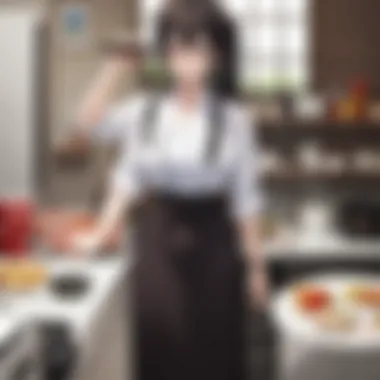
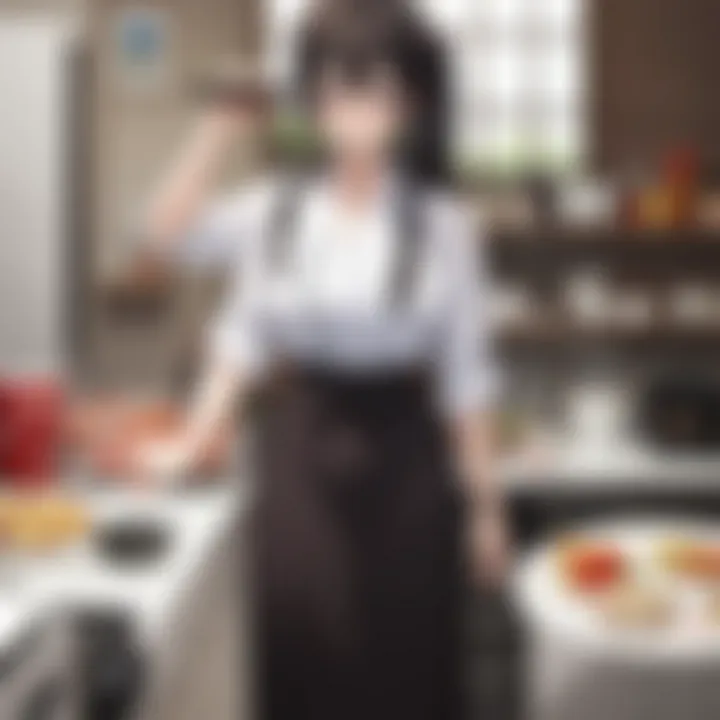
Conflict and Resolution in Culinary Battles
Conflicts in cooking anime and manga frequently stem from rivalry, ambition, and personal struggles. These culinary battles create a backdrop for character evolution and theme exploration. The outcomes often mirror personal growth, turning points, or revelations.
In Shokugeki no Soma, battles are intense and serve myriad purposes. Aside from determining who is the superior cook, these contests often expose vulnerabilities, pushing both protagonists and antagonists to reckon with their pasts, motivations, and fears. Resolution comes within the competition itself. Characters learn from their failures and successes, leading to a deeper understanding of their art and themselves.
Conversely, conflicts can also illuminate broader cultural tensions. For example, when characters from distinct culinary backgrounds face off, the underlying thematic questions—like tradition versus innovation—make the competition about more than just food. Such conflicts often culminate in satisfactory resolutions that enrich character arcs, celebrating the impact of culinary arts on personal and cultural levels.
"Culinary competitions not only entertain. They provoke thought and challenge viewers to reflect on the very piece of culture that food represents."
Culinary battles in anime and manga unveil complex thematic elements that resonate beyond food itself. They depict cultural nuances, status dynamics, and the rich fabric of personal and communal narratives. As the audience engages with these themes, they gain insights into the stories told through culinary arts.
Character Development through Culinary Competition
Culinary competitions in anime and manga provide a profound exploration of character development. Through the lens of cooking battles, we see individuals facing trials that challenge their skills, beliefs, and personal growth. These narratives are not merely about the act of cooking but are fundamentally about the transformation of characters. The kitchen becomes a battleground where they confront not only their peers but also their insecurities and ambitions.
The significance of character development through culinary competition cannot be overstated. First, these scenarios present a vivid platform for characters to evolve. The act of cooking under pressure forces them to confront challenges that often reflect their internal struggles. For protagonists, these encounters foster resilience and determination, allowing them to refine their skills and self-identity. In turn, audiences resonate with these themes, as they are universal in nature.
Moreover, the competitive culinary world in anime and manga often emphasizes relationships among characters. Rivalries and friendships play crucial roles in shaping their development. Characters learn the value of teamwork, mentorship, and even betrayal, which add layers to their personae and enrich the storyline. The cooking competition serves as a catalyst, leading to personal revelations and deeper connections and thus becoming an essential narrative tool.
Protagonists: Growth through Challenges
Protagonists in cooking-themed narratives are frequently depicted as individuals striving for greatness within their culinary pursuits. For many of them, the journey commences with an initial lack of confidence or skill. They encounter formidable challenges, whether in their technique or in the art of presentation, that push them to their limits.
In series like Shokugeki no Soma, the protagonist, Soma Yukihira, illustrates how competition leads to significant character growth. Each culinary battle serves as an opportunity to confront and overcome obstacles. As he faces skilled rivals, Soma not only enhances his culinary prowess but also understands the intricacies of flavors and the depths of creativity required in cooking. This growth is often mirrored in his emotional and psychological journey, highlighting the interconnectedness of skill development and personal growth.
Furthermore, through intense competitions, protagonists often face moments of doubt or failure. This complexity enriches their character arc, portraying that setbacks do not signify the end. Instead, these moments become essential for introspection and reassessment of their values and goals. In such narratives, the journey becomes as important as the destination, leading to a more satisfying character evolution.
Antagonists: The Role of Conflict
Antagonists in cooking wars are equally crucial to the narrative structure and character development. They are not simply barriers to the protagonists’ success; they embody the challenges and philosophies that sharpen the resolve of the main characters. Often, these antagonists present not only technical skills that rival the heroes but also ideological conflicts that challenge their worldviews.
For instance, in Koufuku Graffiti, the character Ryouko serves as both a rival and a motivator. Her culinary talent prompts the protagonist to elevate her standards. This dynamic creates a multifaceted conflict that is not just about cuisine but also grows into themes of identity, love, and passion for food. The protagonists’ encounters with such antagonists enhance their qualities, pushing them toward an evolution where they learn to integrate new perspectives into their culinary repertoire.
Additionally, these conflicts lead to moral dilemmas. Antagonists often question the protagonists’ motives and methods, prompting them to reflect on their relationship with cooking and with others. This not only creates tension but also deepens the narrative's complexity. The interplay between protagonists and antagonists in culinary competitions showcases that growth arises from confronting and overcoming opposition.
Audience Reception and Impact
The phenomenon of culinary battles in anime and manga is not merely a backdrop; it plays a significant role in shaping viewer and reader perceptions. Understanding audience reception is crucial when analyzing the impact of these narratives. The blend of food, competition, and cultural representation resonates deeply with fans, offering them an engaging experience and a chance to relate to characters in a tangible way.
Cooking contests create a bridge between artistry in culinary skills and storytelling. They allow audiences to immerse themselves in the worlds presented, evoking emotions tied to food's universal appeal. Consequently, the nuances of each culinary showdown often reflect broader societal themes, making them relevant beyond mere entertainment. The drive for recognition and excellence depicted in these narratives mirrors real-world aspirations in culinary arts, allowing fans to engage with the subject on multiple levels.
Fan Engagement with Culinary Content
Culinary battles depicted in anime and manga prompt dynamic engagement from fans. This engagement manifests in diverse forms, from fan art to cooking blogs that attempt to replicate dishes seen in shows. Many fans take to social media platforms to share their interpretations of iconic recipes or to discuss their favorite cooking battle moments.
- Community Interaction: Platforms like Reddit provide spaces where fans gather to analyze episodes or chapters. These discussions often delve into techniques showcased and character motivations, creating a sense of community.
- Culinary Education: Many fans find themselves inspired to pursue cooking seriously after consuming these narratives. Series like Shokugeki no Soma have sparked interest in recipes and cooking techniques, encouraging viewers to learn and apply what they see.
- Merchandise and Collaboration: Increasingly, brands have noticed the potential of culinary-themed merchandise. Collaborations with actual chefs or restaurants to create "inspired" dishes from the anime can enhance fan interaction, making the content feel more alive and relevant.
This multifaceted interaction results in a symbiotic relationship between the media and its audience, enriching both sides.
Legacy of Cooking Wars in Pop Culture
The legacy of cooking wars in both anime and manga extends beyond individual series, influencing an entire genre. Their impact on pop culture is substantial, driving trends in representation, narrative style, and audience expectations.
- Influence on Other Genres: Cooking battles have found a way to influence genres outside food-centric narratives. Shows incorporating cooking elements into their plots, even minimally, benefit from the inherent drama and excitement of competition.
- Cultural Exchange: This genre not only showcases Japanese cuisine but also highlights culinary practices from various cultures. The appreciation for diverse foods fosters a global perspective among viewers, leading to a greater understanding of cultural differences.
- Impact on Culinary Tourism: As culinary-themed narratives gain popularity, associated tourism emerges. Fans seek to visit locations featured in their favorite series or dine in restaurants inspired by the shows, thus blending the fiction with real-world experiences.
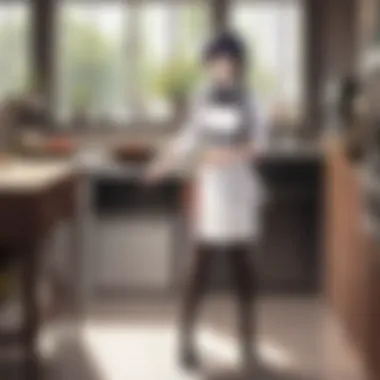
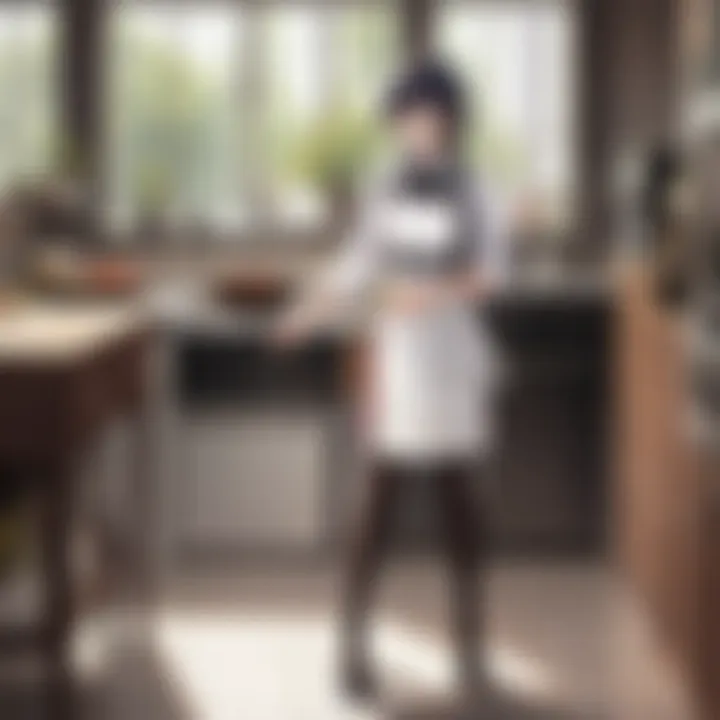
Overall, the cooking wars phenomenon exemplifies the rich relationship between food, culture, and entertainment. It illustrates how culinary competitions are interwoven into fabric of narratives, leaving a lasting impact on both audience engagement and cultural representation.
"Cooking in anime isn’t just about the food; it’s about storytelling through flavors and experiences, creating a lasting connection with the audience."
In summary, audience reception and the legacy of cooking wars play a pivotal role in defining the cultural dialogue surrounding food in anime and manga.
Comparative Analysis of International Cooking Competitions in Media
The exploration of culinary battles extends across various countries, influencing how food and competition are portrayed in different cultural contexts. This analysis examines how cooking wars manifest in both Japanese and Western media, analyzing themes, character relationships, and narrative structures.
Cooking Wars in Western Media
In Western media, cooking competitions often center around professional chefs and the intense environments of competitive cooking. Shows like Top Chef and Chopped emphasize the technical skills and innovative cuisine of participants. Here, the stakes are often framed around professional development, skill mastery, and culinary creativity.
These shows create an atmosphere butting against the urgency of time constraints, showcasing the intense pressure contestants face. This dramatization of competition fosters a sense of immediacy that keeps audiences engaged. The focus is not just on the food but also on personal narratives, often highlighting backgrounds and struggles of the chefs. For instance, MasterChef spotlights amateur cooks, emphasizing their journeys from home kitchens to professional kitchens, thereby appealing to the audience's sense of aspiration.
Moreover, Western cooking shows frequently utilize celebrity chefs as hosts and judges. The inclusion of well-known figures like Gordon Ramsay adds a layer of entertainment, portraying cooking as both an art and a spectacle. This aspect shapes how viewers perceive culinary expertise, often elevating the process of cooking into a form of drama.
Contrasts with Japanese Culinary Narratives
Japanese media presents cooking competitions with a distinct cultural lens. In series such as Shokugeki no Soma, the battles are imbued with deep-rooted cultural significance, linking food to identity, rivalry, and mastery over culinary techniques. Unlike their Western counterparts, Japanese narratives often focus on the emotional and relational aspects of cooking. The protagonist's journey is often as essential as the culinary battles themselves, intertwining personal growth with cooking prowess, generating a rich tapestry of character development.
Moreover, Japanese cooking competitions frequently explore themes of tradition versus innovation. For example, Toriko emphasizes the value of unique ingredients and the deep connections with food. The narrative reflects Japan's appreciation for local produce and artisanal techniques, contrasting sharply with the Western emphasis on competition driven by individualism and professional ambition.
"Japanese culinary narratives often portray food as a source of cultural pride, whereas Western shows focus on personal achievement and skill evolution."
The Future of Cooking Wars in Anime and Manga
Exploring the future of cooking wars in anime and manga reveals essential aspects of how culinary narratives may evolve. This topic is significant as it not only reflects changing consumer tastes but also the growing interest in gastronomy within storytelling. The culinary arts have the potential to capture the complexities of culture, the artistry of food preparation, and the trials of competition, thus creating a rich canvas for storytelling.
Emerging Trends in Culinary Storytelling
In recent years, there has been a surge in innovative storylines and character arcs tied to cooking. Some emerging trends include:
- Focus on Authenticity: More creators are emphasizing authentic cultural dishes. This trend not only educates viewers about diverse cuisines but also fosters appreciation for different culinary heritages.
- Diverse Characterizations: Characters from various backgrounds are becoming central to culinary narratives. This shift reflects global influences and encourages a broader understanding of food habits worldwide.
- Realistic Cooking Techniques: Rather than purely fantastical elements, many current titles show realistic cooking practices. This trend results in a deeper connection between the audience and the cooking process, portraying culinary skills as attainable and rewarding.
- Health and Sustainability: Topics related to health and ecological sustainability are now being integrated into culinary stories. Anime and manga are beginning to reflect societal concerns, encouraging characters to embrace healthier cooking methods and sustainable ingredients.
These trends signal a progression towards narratives that engage the intellect and expand the understanding of culinary arts.
Potential for Cross-Cultural Collaborations
The growing popularity of cooking-themed anime and manga opens avenues for cross-cultural partnerships. Several factors contribute to this potential:
- Global Market Appeal: Increased interest in Japanese culture has attracted focus on cooking narratives outside Japan. International collaborations can bring together diverse culinary techniques and storytelling styles.
- Fusion Cuisine: Creators can experiment with fusion dishes that blend traditional Japanese cooking with other culinary styles. This can lead to unique narrative angles and engaging visual storytelling.
- Collaborative Projects: There is opportunity for collaborative projects that feature chefs and culinary experts. These partnerships can enhance authenticity and provide educational content, enriching the viewer's experience.
- Culinary Competitions: More cross-cultural competitions can be portrayed. This expands the narrative scope, showcasing various cooking styles while creating conflict and resolution through different culinary practices.
The future of cooking wars in anime and manga indicates an ever-expanding landscape of potential stories, rich with cultural insights and culinary artistry. Engaging narratives that emerge from these trends and collaborations can lead to new forms of storytelling that resonate on a global scale.
Closure: The Essence of Cooking Wars
Cooking Wars in anime and manga encapsulates much more than mere competition over culinary skills. It reflects cultural values, personal growth, and societal development. This genre captivates audiences through its intricate blend of storytelling and food artistry. As shown throughout the article, culinary competitions serve as a stage for characters to express their talents and confront their limitations. The narratives often delve into the psychology of the characters, exploring themes of ambition, rivalry, and friendship. This complexity enriches the overall narrative and keeps the audience engaged.
Summary of Key Insights
- Cultural Significance: The representation of cooking in anime and manga highlights specific cultural elements. It informs viewers about regional ingredients, cooking techniques, and traditional practices. This context adds layers to the storytelling, grounding it in reality while allowing for creative expression.
- Character Development: Characters undergo significant transformation through their culinary battles. Each competition pushes them to confront personal and emotional challenges. These arcs reveal deeper facets of their personalities, making them relatable and dynamic.
- Thematic Exploration: Recurring themes include perseverance, innovation, and the societal perception of success. Culinary wars often parallel real-life struggles, making these shows resonate with a wide audience.
"Cooking battles in anime are not just about food; they reflect deeper societal themes and the essence of human relationships."
Implications for Future Research
Future research into Cooking Wars can explore several areas:
- Comparative Studies: Analyzing Cooking Wars with similar themes in different cultures, such as Western cooking shows, could provide insights into diverse culinary narratives.
- Impact on Culinary Arts: Investigating whether these stories inspire real-life cooking practices and appreciation for culinary arts would offer a unique perspective.
- Cross-Cultural Collaborations: The potential for integrating cooking techniques and storytelling methods from various cultures holds promise for future adaptations and innovations in both anime and manga.
In summary, the genre of Cooking Wars serves as a rich tapestry for exploring human experiences, cultural exchanges, and emotional journeys. It encourages both creators and audiences to engage in the culinary arts as a form of expression.















